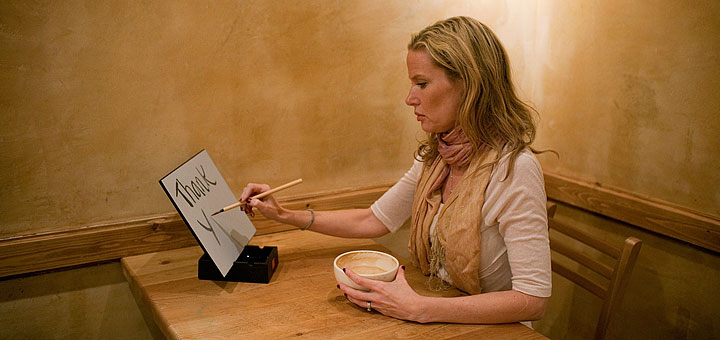
Psychological research finds that people’s happiness levels are remarkably stable over the long-term. Whether you win the lottery or are paralysed from the neck down, after about three to six months you’ll have returned to your usual level of happiness. While these findings are deeply counter-intuitive, they also raise a serious problem for those wanting to increase levels of happiness permanently.
A possible answer comes from recent research in the psychology of gratitude. Yes, you read that correctly – being thankful might be the key to raising your happiness ‘set-point’. And there is some good experimental evidence to back up this theory.
Counting blessings versus burdens
In his new book ‘thanks! ‘, Dr. Robert A. Emmons describes research he carried out with three experimental groups over 10 weeks (Emmons & McCullough, 2003):
‘, Dr. Robert A. Emmons describes research he carried out with three experimental groups over 10 weeks (Emmons & McCullough, 2003):
- The first group were asked to write down five things they were grateful for that had happened in the last week for each of the 10 weeks of the study. This was called the gratitude condition.
- The second group were asked to write down five daily hassles from the previous week. This was the hassles condition.
- The third group simply listed five events that had occurred in the last week, but not told to focus on positive or negative aspects. This was the events or control condition.
The types of things people listed in the grateful condition included:
- Sunset through the clouds.
- The chance to be alive.
- The generosity of friends.
And in the hassles condition:
- Taxes.
- Hard to find parking.
- Burned my macaroni and cheese.
Before the experiment began participants had kept daily journals to chronicle their moods, physical health and general attitudes. These was then used to provide a comparison for after the experimental intervention.
Happiness up 25%
People who were in the gratitude condition felt fully 25% happier – they were more optimistic about the future, they felt better about their lives and they even did almost 1.5 hours more exercise a week than those in the hassles or events condition.
All this from reflecting on the pleasure of having seen the sunset through the clouds? Dr Emmons also expresses surprise at the findings of the study, partly because there are some reasons practising gratitude might not be so good.
For example, focussing on gratitude reminds us what we owe to others. This may in turn remind us of our dependence on others and reduce a sense of personal control. Thinking in terms of gratitude may also focus us on the debts we owe to others and, studies have shown, people don’t enjoy feeling indebted to others.

Just the effect of positive comparisons, or really gratitude?
Yet, despite these reasons why gratitude might not increase happiness, it seems that it does. But does the benefit from the gratitude condition simply result from thinking about how we are better off than others?
In a second study, very similar to the first described above, Emmons and McCullough changed one of the control conditions. Instead of asking people to write down any events from the week, people were asked to list ways in which they were better off than others. The idea was that in this condition people are making positive comparisons but are not necessarily thinking gratefully (although it can’t be ruled out!).
Again, though, the results showed that those in the gratitude condition were significantly happier than those making positive comparisons between themselves and others. Unsurprisingly those practising being grateful were also happier than those focussing on daily hassles.
Gratitude can help those with chronic health problems
A good criticism of the first two studies was that they were carried out in undergraduate students. It’s all very well increasing the happiness of young, healthy college students, but what about people with serious, chronic health problems?
In a third study Emmons and McCullough recruited adults who had neuromuscular disorders, often as a delayed result of surviving infection by the polio virus. While not life-threatening the condition can be seriously debilitating, causing joint and muscle pain as well as muscle atrophy. People with this condition have a good reason to be dissatisfied with the hand life has dealt them.
In this study a gratitude condition was compared to a control condition in which participants wrote about their daily experience. After the 21 day study, participants in the gratitude condition were found to be more satisfied with their lives overall, more optimistic about the upcoming week and crucially, were sleeping better. Good sleep is important as it has been found to be a great indicator of overall well-being. People who sleep well are generally healthier and happier than those whose sleep is poor.
Practising gratitude
Even if gratefulness has benefits in the short-term, it still raises more long-term questions. What are the major obstacles to living a grateful life? Can gratefulness really increase happiness over a lifetime? Finally, how exactly can gratefulness be increased? It’s this last question that I’ll be addressing in the next post with Dr Emmons’ top ten methods for practising gratitude.


No comments:
Post a Comment